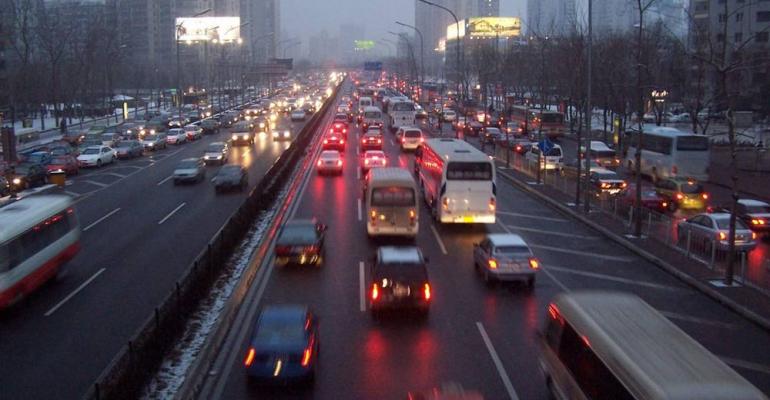BEIJING – Industry analysts are assessing the impact of the State Council’s recent decision to swiftly impose the new China-5 emissions standard for vehicles here.
The law already applies to new diesel-powered vehicles sold or registered in the capital city as of Feb. 1, with gasoline counterparts now set to follow March 1.
No official reason is given for the decision, although industry experts assume it was sparked by the toxic blanket of air pollution that settled on Beijing and its surrounding provinces throughout January.
Analysts predict enactment of the standard likely will accelerate the government’s push to improve emissions standards across the country, providing lucrative opportunities for overseas vehicle-component suppliers.
The China-5 standard is roughly equivalent to the European Union’s Euro 5 introduced in 2009, says Fang Li, spokesman for the Beijing Municipal Environmental Protection Bureau. The goal in China is to reduce vehicle pollution 40%. However, some 1,300 vehicles currently on sale in the region already meet the standard, he says.
Enacting the stricter emissions standard is something of a watershed moment for China, which long has stalled in implementing the new rules due to the obstacles it faces in enforcing them in areas where the China 4 standard currently applies.
 “The issue lies in the fact (cars that meet) the China-5 standard are more expensive and local Chinese auto makers will see a drop in sales as a result, as many of their vehicles do not meet these standards,” automotive-consulting firm IHS Automotive analyst Namrita Chow says in a recent note to clients.
“The issue lies in the fact (cars that meet) the China-5 standard are more expensive and local Chinese auto makers will see a drop in sales as a result, as many of their vehicles do not meet these standards,” automotive-consulting firm IHS Automotive analyst Namrita Chow says in a recent note to clients.
Yet, as long as the standard remains confined to Beijing, analysts suggest its impact will be limited.
John Zeng, Asia director of industry consultancy LMC Automotive, says the big local players that sell cars in Beijing, such as Chery, Geely and Beijing Auto, have had time to meet the cost of the necessary vehicle upgrades, which he puts at roughly RMB2,000 ($320) a vehicle.
But smaller domestics that sell in the lesser markets don’t hold enough market share to warrant a change in their sales strategy.
Others say increased public awareness of the impact of auto pollution on air quality and the antipathy it has caused might prompt the government to rush through the new regulations elsewhere.
“It is important, and I do expect (the new emissions standard) to be rolled out nationwide,” says Steve Man, auto analyst with Nomura Securities in Hong Kong. “Historically, (officials) will introduce this type of standard (in Beijing) and the rest of the country will follow after a few months.”
Indeed, Man sees the new emissions standard being implemented on a province-by-province basis over the next year-and-a-half.
Such a sweeping policy move would open a raft of opportunities, particularly for foreign component suppliers, he says. “I think you will see more cars using turbochargers, even with gas engines. Other parts suppliers stand to benefit from upgrades to catalytic converters, so you’re talking about TRW, Honeywell and BorgWarner.”
Turbochargers use exhaust to boost engine power without adding much weight, helping auto makers produce smaller, more fuel-efficient engines to meet stricter emissions regulations.
 Honeywell and BorgWarner are the world’s leading turbocharger suppliers, but companies including IHI and Bosch also are well-positioned to benefit from a push towards improved standards.
Honeywell and BorgWarner are the world’s leading turbocharger suppliers, but companies including IHI and Bosch also are well-positioned to benefit from a push towards improved standards.
Man also raises the possibility China may look to adopt the equivalent of the Euro 6 standard by 2016, though he is quick to add the government would make sure domestic suppliers were prepared for such a move before it went ahead.
While Man doubts the government would offer direct subsidies to help the entire auto industry upgrade, he suggests it could offer targeted rewards for domestic auto makers that invest in new, cleaner technologies.
Yet there are a number of complex issues that need to be untangled before the government can proceed along this path. A key consideration is who will pay for the higher-quality fuel needed to run the upgraded engines.
Michael Dunne, president of automotive strategic marketing firm Dunne & Co., believes the government faces a real challenge. While car buyers in Beijing and other major cities might be able to afford higher fuel costs, those in less-developed cities and rural areas will struggle.
Any attempt to subsidize fuel purchases will result in the emergence of a black market for fuel, he warns.
“If you move too fast on high standards, the Chinese manufacturers may not be able to get there, which means lost jobs and a blow to national hopes for Chinese firms to dominate the local market. Foreign firms definitely would benefit from an increase in emissions standards, because they have the technology in hand,” Dunne says.
China’s State Council in recent weeks has issued a timetable to upgrade fuel quality to ensure compliance with the China 5 emissions standard across the country before the end of the year, with a grace period until the end of 2017.
Such a long lead time gives the government ample time to fine-tune policy but offers no clear indication of how far and how fast the country will go with upgrading its fuel and emissions standards.
Either way, government policy moves to address China’s air-pollution problems will have important ramifications for both domestic and foreign auto makers and suppliers.





